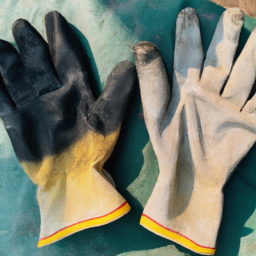Cleaning Gardening Gloves How To
Table of Contents []
How To Clean Gardening Gloves
Introduction
Gardening gloves are essential safety and protective gear for any avid gardener. In order to reap the full benefits of gardening gloves, it is important to take care of and clean them regularly. It is also important to purchase the right type of gardening gloves depending on the gardening job at hand. In this article, we will look into 8-12 topics related to gardening gloves and provide tips on how to clean them in order to extend their lifespan and usefulness.
Different Types of Gardening Gloves
The first important topic in our article is the different types of gardening gloves that are available in the market. There are several types of gardening gloves depending on the kind of job to be done and the protection needed. These range from gloves made of natural materials like cotton and leather to ones made of synthetic materials like nitrile and neoprene. Popular subtopics include Print Leather Gardening Gloves, Cloth Gardening Gloves, Nitrile Gardening Gloves, Neoprene Gardening Gloves, PVC Gardening Gloves, and Cotton/Blend Gardening Gloves.
We can begin our description by looking at the pros and cons of each type of gardening glove. Print Leather gloves provide plenty of durabilty and protection from thorns and have water-resistant qualities; however, they are less breathable and can sometimes prove to be uncomfortable. Cloth gloves provide good grip, breathability, and light protection, but they are less durable than leather or nitrile gloves. Nitrile gloves are a popular choice as they are extremely durable, provide lots of protection, and are also puncture-resistant; however, they may not be the best choice for jobs requiring precise fingertip work. Neoprene gloves provide high-grip performance and are insulated, making them suitable for cold weather. PVC gloves provide high abrasion resistance and are suitable for heavy-duty gardening tasks. Cotton/Blend gloves are made of softer materials, which increase comfort and breathability; however, they are not as durable as the other types.
Cleaning Tips
The second major topic in this article would be the steps to cleaning and maintaining your gardening gloves. It is important to clean your gloves regularly, especially if you are using them for sensitive tasks in the garden (like harvesting fruits and vegetables). Start by inspecting your gloves for any holes or tears, and if you find any, discard them and purchase a new pair. An important tip while cleaning gloves is to each type of glove has its own cleaning method and material.
For print leather gloves, use a mild soap and a damp cloth to remove dirt and debris. It is best to stuff the gloves with newspaper and let them air-dry. For cloth and cotton gloves, soak them overnight in a baking-soda-vinegar-water solution and then air-dry them. For nitrile gloves, use a mild soap and a damp cloth to remove dirt and debris, and air-dry them. For neoprene gloves, a mild detergent and cool water should be used in order to remove dirt and debris. Lastly, for PVC gloves, use a mild detergent and warm water and then air-dry them.
Basic Tips for Increasing the Lifespan of your Gloves
It is also important to take care of your gloves in order to extend their lifespan, and here are various tips that you can use. Firstly, store your gloves away from direct sunlight or in an area that has low humidity. Secondly, keep them away from sharp tools or objects as these can easily puncture or tear them. Thirdly, wash your gloves after every use. Finally, do not over-stretch them or leave them tight when not in use as this can also cause them to tear.
Summary
In conclusion, there are various kinds of gardening gloves available in the market that can help protect your hands and improve your gardening experience. It is important to use the right type of gardening glove for the job and take care of them in order to extend their lifespan. For optimal results, it is best to properly clean and store your gloves after each use. With careful care and maintenance, you can make sure that your gloves stay in prime condition and last a long time.

Previous Page
